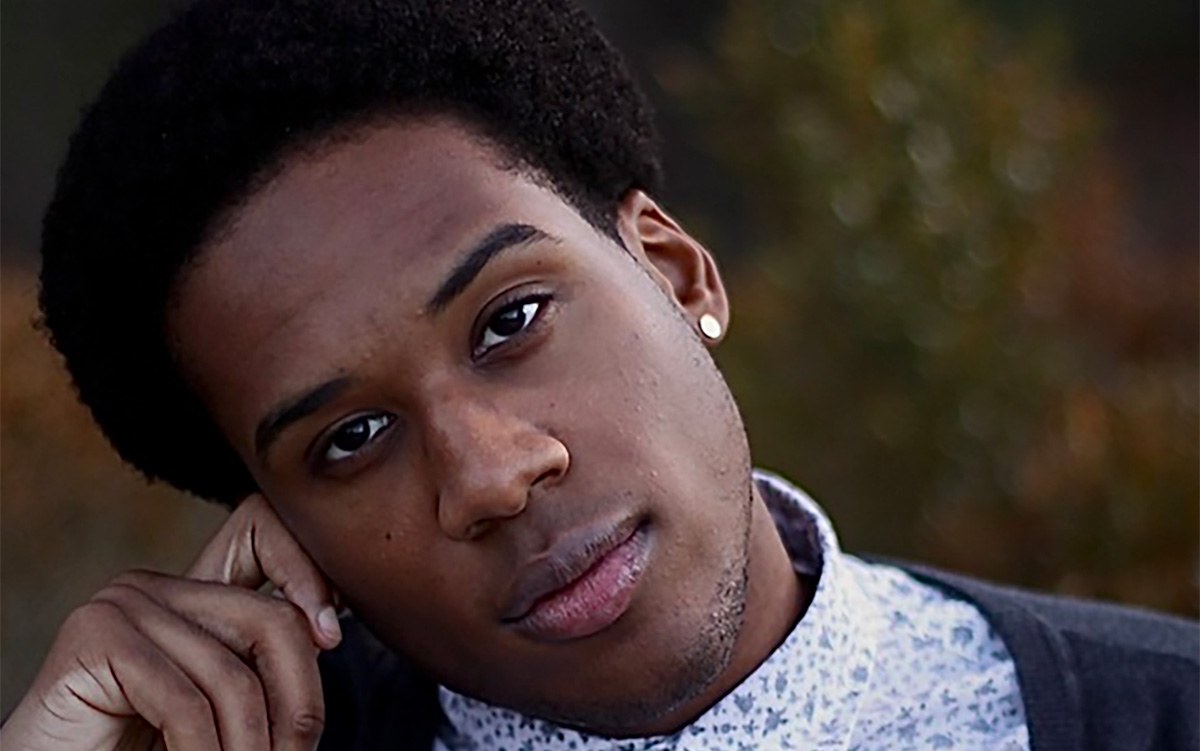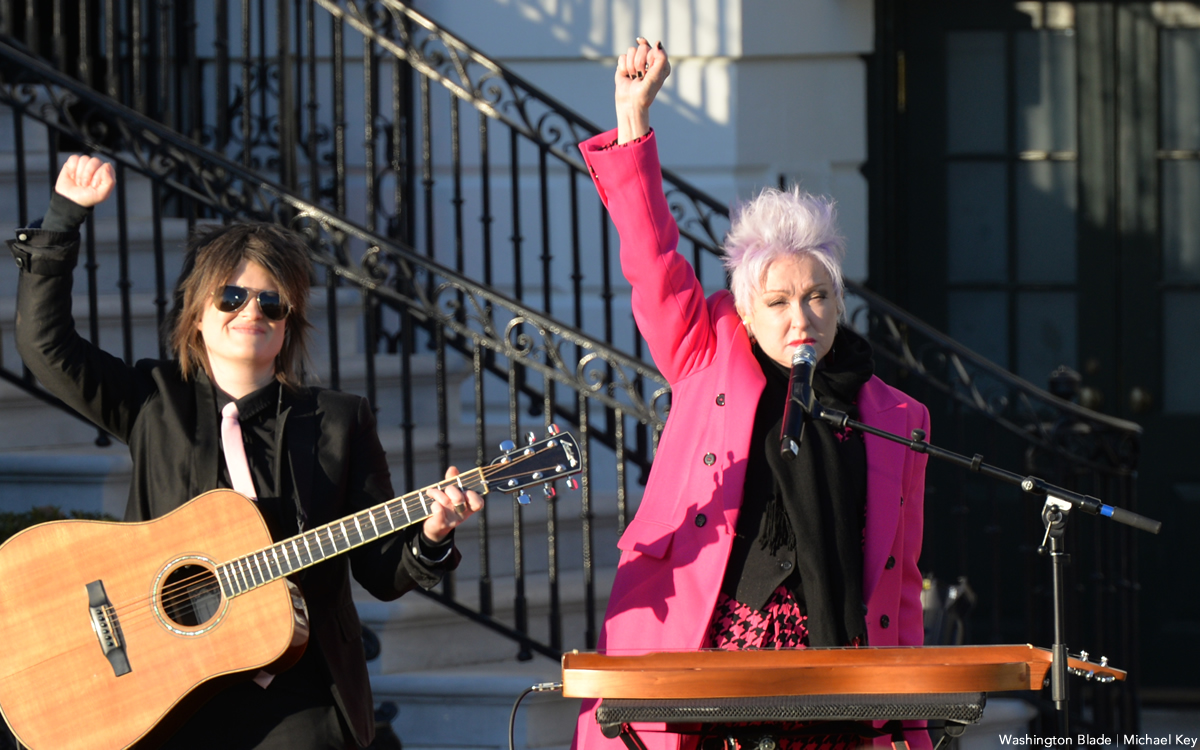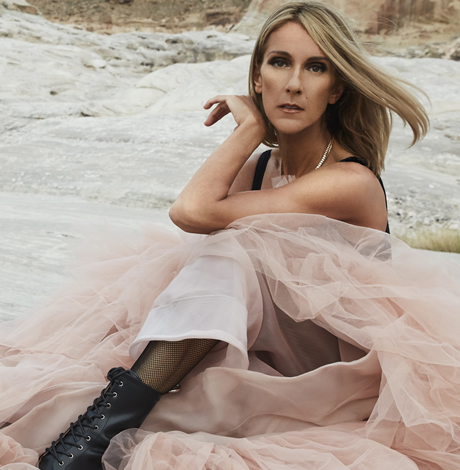Music & Concerts
WMC’s ‘Comfort and Joy’ fuses drama, well-being, light
Soloist describes production as ‘reverent and beautiful’

‘Comfort and Joy’
Washington Master Chorale
Sunday, Dec. 22, 5 p.m.
Church of the Epiphany
1317 G St., N.W.
washingtonmasterchorale.org
With its warmth and unfettered imagination, it’s no surprise that the Washington Master Chorale’s enduringly popular winter program remains a holiday favorite.
This December the Washington Master Chorale (WMC), helmed by out artistic director Thomas Colohan presents “Comfort and Joy” a selection of British and American works like “Lute-Book Lullaby,” “I Saw Three Ships,” “Puer Natus” by Samuel Scheidt and “Hosanna to the Son of David” by Orlando Gibbons.
In addition to these Christmas classics, WMC will perform 2022 Florence Price Commission Winner Mason Bynes’s “Ephiphanytide” and Ēriks Ešenvalds’ “Northern Lights,” the firsthand accounts of arctic explorers Charles Francis Hall and Fridtjof Nansen and their experiences surrounding the fabled aurora borealis.
Described as “reverent and beautiful” by “Northern Lights” tenor soloist Opal Clyburn-Miller, “Comfort and Joy” fuses drama and well-being, and the import of light.
And as an artist who uses they/them pronouns, Clyburn-Miller says where classical music is concerned, “it seems people are put in their boxes and that’s where they stay.” They add, “there’s been some progress. It’s pretty much a traditional art form.”
With regard to their career, Clyburn-Miller, the Baltimore based Peabody Conservatory student, says the work usually comes through word of mouth: “You show up, you’re a good colleague and people want to work with you again.”
The solo piece, according to Colohan, is perfect for Clyburn-Miller. The soloist says in response: “Maybe I have the imagination to think of what Northern Lights might look like in Eastern Europe. I’ve never been that far north but I can put myself in that sense of wonder and astonishment.”
But the gig hasn’t been entirely without its tests. The lyrics are in Latvian, a new language for the meticulous singer.
“It’s been a bit tricky getting the Latvian down,” they say. “Usually in my singing experience, it’s been German, Italian and French, and I’m familiar with Spanish and some Hungarian and Russian, but this is entirely new.”
A perfect chorale venue requires easy parking; good acoustics; a concert level Steinway, and an excellent organ; a sanctuary wide enough to accommodate a 50-person chorale; and audience friendly loos, says Colohan.
The Church of Epiphany meets most if not all of these requirements.
Raised Catholic in Richmond, Colohan came out at Ohio’s progressive Oberlin Conservatory. Around this time, he remembers visiting Washington for a music educator’s conference and partying at JR.’s, Badlands, and other bars. He says, “I saw that D.C. had a huge population of clean-cut gay boys. That journey which started with me being gay, prompted me to ask questions.”
As WMC artistic director since 2009, Colohan, who lives with his partner in Silver Spring, became increasingly interested in secular poetry and literature, especially the ways in which it intersects with chorale music. For him, that became the heart of the art form.
“My secular approach is wider than some. I’m like the curator of the museum going down to the basement to bring some stuff up. You cannot hear the music if we don’t sing it.”
He’s remained conservative as an aesthetic but not an ethos. “I can wear a blazer and not be crazy right wing. Spiritually speaking, I’m Zen Buddhist now.”
A lot of the concert is about darkness and light. Colohan says, “In ancient times when the world became darker, the days leading to the solstice were scary and then on the 22nd they saw that days were getting longer and it was lighter.”
“Comfort and Joy” closes with a candle lit chorale memorably singing “Silent Night.”
Music & Concerts
Washington chorale kicks off Christmas with vibrant program
‘Thine Own Sweet Light’ concerts planned

The full Washington Master Chorale will return for its annual holiday concert tradition with “Thine Own Sweet Light” on Friday, Dec. 19 and Sunday, Dec. 21 at St. Ann’s Catholic Church (D.C.) and Church of the Epiphany (D.C.).
The concert will feature the rich sounds of the 50-voice, a cappella chorus performing lush, seasonal choral music inspired by the theme of light. Highlights include Edvard Grieg’s “Ave Maris Stella,” Eric Whitacre’s “Lux Aurumque,” and Christopher Hoh’s “Holy, Holy, Holy is the Lord God of Hosts.” The program will also present a new work by Barcelona composer Josep Ollé i Sabaté, along with charming holiday folk songs and seasonal favorites.
For more details, visit the Washington Master Chorale website.
Music & Concerts
Queer mega stars (and allies) ready to take D.C. stages this fall
Watch LGBTQ icons light up stages across the DMV as they sing, dance, and drag their way through spectacular shows.

One of the best ways to welcome fall is by catching LGBTQ performers (and their allies) lighting up some of the D.C. area’s biggest stages. From country and pop to drag and rock, the season is packed with shows you won’t want to miss.
Maren Morris – The country, rock, and pop diva—known for hits like “The Bones” and for standing up against Nashville’s anti-LGBTQ voices—takes the stage at Wolf Trap (1551 Trap Rd, Vienna, Va.) on Friday, Sept. 12 at 8 p.m. Tickets start at $64.
RuPaul – The mother of modern drag and host of “RuPaul’s Drag Race” will spin a DJ set at Echostage (2135 Queens Chapel Rd NE) in Northeast D.C. on Sept. 20. Before RuPaul swaps wigs for headphones, Trade and Number 9 owner Ed Bailey will warm up the decks. For tickets and details visit echostage.com.
Conan Gray – The queer pop prince, celebrated for his Gen Z anthems like “Heather” and “Maniac,” brings his Wishbone Pajama Show to EagleBank Arena in Fairfax, VA, (4500 Patriot Cir) on Sept. 20 at 8 p.m. Tickets start at $113. For more info visit shop.conangray.com/pages/tour.
All Things Go Music Festival – With a lineup that includes Noah Kahan, Lucy Dacus, Kesha, Clairo, Doechii, and more, the beloved LGBTQ-friendly festival takes over Merriweather Post Pavilion (10475 Little Patuxent Pkwy, Columbia, Md.) Sept. 26–28. For tickets and details visit allthingsgofestival.com.
BERTHA: Grateful Drag – This unique tribute brings drag artistry and the sounds of the Grateful Dead to The Atlantis (2047 9th St NW) on Sept. 27. Tickets start at $47 at theatlantis.com.
Peach PRC – Rising Australian pop star and out lesbian, whose confessional tracks like “Perfect for You” and “Forever Drunk” have made her a queer TikTok darling, performs at The Atlantis on Sept. 29 at 6:30 p.m. The show is general admission only. Additional details are on theatlantis.com.
Addison Rae – The TikTok star-turned-pop princess, who’s crossed over into music with glossy hits like “Diet Pepsi” brings her sold out show to The Anthem (901 Wharf St., S.W.) on Sept. 30. Tickets are sold out, but resale options start around $80. For more info visit theanthemdc.com.
The Rocky Horror Picture Show 50th Anniversary – Celebrate the cult classic that’s been a queer midnight-movie staple for decades, with Barry Bostwick (a.k.a. Brad Majors) at the Warner Theatre (513 13th St., N.W.) on Oct. 2 at 8 p.m. Tickets start at $41 via Ticketmaster.
Chaka Khan, Patti LaBelle, Gladys Knight & Stephanie Mills – Four legends, one stage. Between Khan’s funk, LaBelle’s soul, Knight’s R&B, and Mills’ powerhouse vocals, this concert at Capital One Arena (601 F St NW) on Oct. 3 at 8 p.m. promises pure diva magic. Tickets start at $103. For more details visit capitalonearena.com.
Lorde – Joined by The Japanese House and Chanel Beads, the Grammy-winning New Zealand singer-songwriter behind “Royals” and “Solar Power” returns to The Anthem on Oct. 4 at 7 p.m. Lorde has long been embraced by queer fans for her dreamy pop and subversive lyrics. For more info visit theanthemdc.com.
Andy Bell (of Erasure) – The British queer rock icon, best known for synth-pop classics like “A Little Respect” and “Chains of Love,” brings his Ten Crowns Tour to the Lincoln Theatre (1215 U St., N.W.) on Friday, Oct. 17 at 8 p.m. Tickets are $90.45.
Doechii – The self-described queer “Swamp Princess”—and WorldPride 2025 headliner—continues her breakout year with the Live from the Swamp Tour at The Anthem on Oct. 21 at 8 p.m. Known for blending rap, R&B, and avant-garde performance art, Doechii is one to watch. Tickets start at $153.
Neon Trees – The out-and-proud Utah rockers behind “Everybody Talks” and “Animal” perform at the Lincoln Theatre on Friday, Oct. 24 at 8 p.m. Lead singer Tyler Glenn, who came out publicly in 2014, has become a strong queer voice in alternative rock. For tickets and info visit impconcerts.com.
Sasha Colby – The “RuPaul’s Drag Race” Season 15 winner strips down on the Stripped II Tour at the Warner Theatre on Nov. 2 at 8 p.m. Tickets available now on Ticketmaster.
Lola Young – The bisexual indie-pop sensation, whose raw songwriting has earned her millions of TikTok fans and multiple chart soaring hits visits The Anthem on Nov. 9 at 8 p.m. Tickets are still available.
Opera Lafayette
Featuring Mary Elizabeth Williams as Dido
+ Elijah McCormack, Chelsea Helm
Oct. 16, 7:30 p.m.
Sixth & I
PostClassical Ensemble
The Pale Blue Do: A Musical Voyage Inspired By Nature
Featuring National Geographic’s Enric Sala, Guest Curator
Wednesday, November 19, 7:30 p.m.
Terrace Theater
Washington Concert Opera
Starring Kate Lindsey, Theo Hoffman, John Moore, and Fran Daniel Laucerica
Nov. 23, 6 p.m.
Lisner Auditorium
Washington Master Chorale
An intimate a capella concert taking place in an architectural jewel, featuring cherished choral gems from Anglican and Catholic tradition and early American hymns. The concert will also present the world premiere of Christopher Hoh’s Holy, Holy, Holy is the Lord God of Hosts, and hymn singing featuring Robert Church, organist and choirmaster at St David’s.
Oct. 18, 7:30 p.m.
October 19, 5 p.m.
St. David’s Episcopal Church
Music & Concerts
Cyndi Lauper ready to have fun in Virginia
Superstar to bring final leg of farewell tour to Jiffy Lube Live

Superstar Cyndi Lauper will bring the final leg of her farewell tour “Girls Just Wanna Have Fun” to Bristow, Va., on Thursday, July 24 at Jiffy Lube Live.
Lauper’s international Farewell Tour – her first major headlining run in a decade – kicked off in North America last October, and included her first time ever headlining (and selling out) Madison Square Garden. Lauper’s performances have earned raves from the New York Times, Rolling Stone, Billboard, and many more, and surprise guests have included Chaka Khan, Sam Smith, and Hayley Williams. The tour just visited the U.K. and Europe, and will head to Australia and Japan in April.
Tickets are available on Live Nation’s website.



















